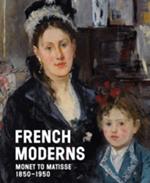The years between the Revolution of 1848 and the end of World War II were characterised by profound social, intellectual and political change in France. The art world, centred in Paris, also witnessed remarkable transformations as artists experimented with bold, expressive styles – Realism, Impressionism, Post-Impressionism, Symbolism, Fauvism, Cubism and Surrealism – that soon influenced the Western artistic canon.The Brooklyn Museum was pioneering in the collecting and exhibiting of French modernism decades before its landmark 1921 exhibition, Paintings by Modern French Masters: The Post Impressionists and Their Predecessors, which hailed the then ‘radical tradition of French painting.’ This splendid volume featuring 59 works from the Brooklyn Museum’s renowned European collection celebrates France as the artistic centre of international modernism from the mid-nineteenth to the mid-twentieth century. Ranging in scale, subject matter and style, these paintings and sculptures were produced by the era’s leading artists, both Frenchborn and others who studied and worked in France. The 47 artists represented include Gustave Caillebotte, Paul Cezanne, Marc Chagall, Gustave Courbet, Edgar Degas, Andre Derain, Augustus John, Henri Matisse, Jean-Francois Millet, Claude Monet, Berthe Morisot, Odilon Redon, Pierre-Auguste Renoir, Auguste Rodin and Edouard Vuillard. Organised into four sections, the works in this book exemplify the successive avant-garde movements that defined modern art in the nineteenth and twentieth centuries, tracing a shift from naturalism to the rise of abstraction. The themes of ‘Landscape’, ‘Still Life’, ‘Portraits and Figures’ and ‘The Nude’ reveal illuminating comparisons and contrasts across time and mediums.

French moderns: Monet to Matisse 1850-1950
ISBN: 9781785515996
Format: Hardback
Publisher: Scala (HEDS)
Origin: GB
Release Date: February, 2025


